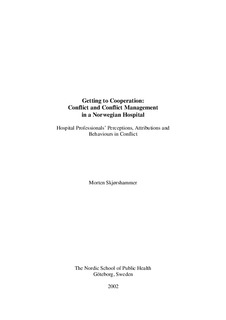Getting to Cooperation. Conflict and Conflict Management in a Norwegian Hospital. Hospital Professionals’ Perceptions, Attributions and Behaviours in Conflict
Doctoral thesis
Permanent lenke
http://hdl.handle.net/11250/275094Utgivelsesdato
2002Metadata
Vis full innførselSamlinger
Sammendrag
The purpose of the research was to investigate conflicts related to work coordination in hospitals. Increasing specialisation and professionalisation, coupled with high degrees of work interdependence over the past years, have greatly increased the conflict potential in hospitals. Because hospital professionals have to work together, they cannot avoid differences, disagreements and disputes that may result in conflicts. Conflict is a factor in poor communication, which causes adverse events and harm to patients. Some of the questions addressed include: How do professionals go about managing conflicts? What kind of behaviours do they use? How are conflicts perceived and what are the reasons for having conflicts? What kind of emotions accompany conflicts? How do professionals talk about their conflicts? The data are based on a nation-wide survey in 1993 of the work environment and living conditions of doctors in Norway, and an ethnographic study of a Norwegian urban hospital (from 1996 through 1999) utilising data gathered through interviews, observations and review of existing documents. One reason for using these methods is that they allow for exploration of the emotional factors in conflict, which have been neglected in previous studies. Triangulation was used to discover similar patterns in the findings produced by each method and to increase the validity of the findings.
Beskrivelse
Dissertation from the Nordic School of Public Health, Göteborg, Sweden
